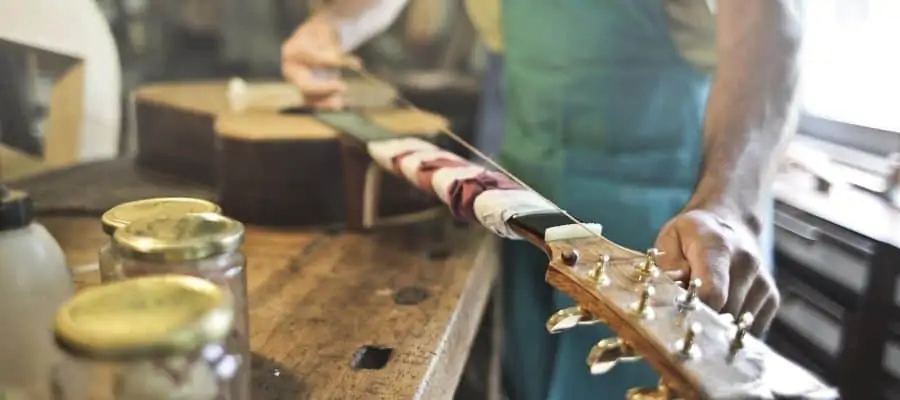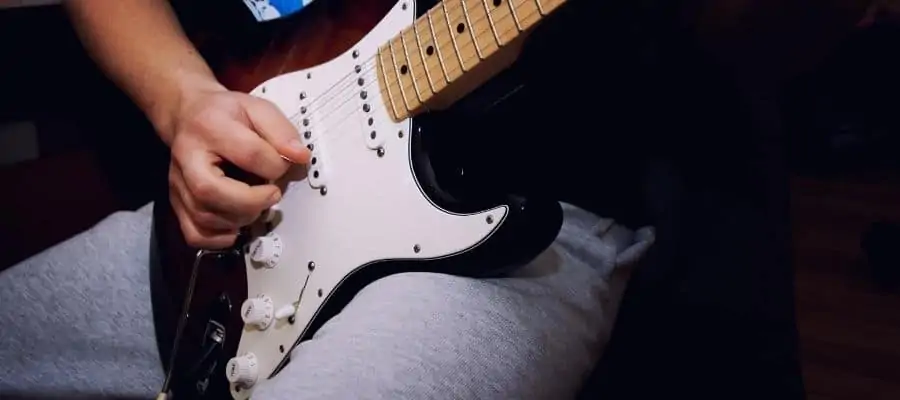Mistakes can happen to anyone trying to learn to play the guitar. Common mistakes guitar players make can affect both beginners and intermediate players, and you might have made some of these mistakes.
It is natural to make mistakes while learning. You start something new that you know nothing about. Especially if you don’t have a teacher. Guitar teacher can help you spot most of the common mistakes as soon as they show up.
But if you are self-taught or trying to be, you recognize some of these most common mistakes.
Not Having Proper Guitar Set-up

This might be one of the most important tips you’ll get. Guitar set-up is a term used to describe the fine-tuning of your instrument. String action or height, the intonation of each string, straightness of the neck, are all part of the guitar set-up.
Naturally, if the guitar isn’t correctly set-up, the sound coming out of it will be wrong no matter if your finger position is right. The electric guitar has lots of springs and screws that can move due to temperature changes, humidity, or any other reason.
If you are a beginner, it is natural for you not to know what each and every screw does. You can always check a number of YouTube videos to get a better understanding of the guitar parts. One of the main reasons you should learn this is so you can adjust the instrument according to your playstyle.
If you still don’t feel comfortable experimenting with your guitar, you can always take it to the service and let the technician do a professional guitar set-up. Whatever you decide, you should always be sure that everything is ready for playing before you start practicing.
Not Changing Strings Often
Beginner players can sometimes forget to change strings. Some of the players think that strings should only be changed if they break. Beginner players are also sometimes scared of changing strings. Whatever the reason may be, the strings should be changed every few months.
Depending on the time you spend playing guitar, strings can lose their mechanical properties after months of playing. It will result in the guitar not being able to stay in tune for long or even frets and fretboard wear if the strings are rusty.
With proper care, you can ensure that strings are used for several months using cleaners and other guitar care products.
Using The Wrong Type Of Strings
All of us are different so be sure to experiment with different gauges or brands until you find the set that suits your needs. There are players who love heavy strings and opt to buy .12 or sometimes even heavier sets.
On the other hand, Billy F. Gibbons from ZZ Top uses .06 gauge so he would probably be less comfortable playing someone else’s guitar. There is no right answer for the type of strings you should use, so don’t try to find out what other people use, go explore and find which one is perfect for your guitar playing style.
Not Using A Metronome
Guitar players are species that are most likely to ignore the existence of metronome. Metronome is one of the best tools you can use to practice. Yet, many players choose to ignore it.
No matter how accurate your playing is and how perfect every note you play is, if you play out of tempo or if your timing is bad, you will end up sounding bad. Always practice with a metronome or if you don’t have it, at least practice with your foot thumping the beat.
This is one of the reasons you need at least some guitar music theory. The electric guitar is almost always accompanied by other instruments. And the last thing you want is to play faster or slower than the rest of the band. You will stick out like a sore thumb if you don’t pay attention to tempo.
Holding The Guitar Wrong
Learning the guitar is never easy. So be sure to hold the guitar properly to avoid complicating the learning process even more. If you have trouble playing a certain chord or lick, there might be a chance that your posture is wrong.
You should never have back problems. By finding that comfortable position, you’ll be able to learn faster and play for longer without any issues.
Avoiding Music Theory
We all heard stories of a child prodigy that just picked up an instrument and started creating symphonies. In the last fifty years, the electric guitar has become the most popular instrument.
Naturally, not everyone has a proper music education. Lots of guitar players straight avoid music theory. Yes, it is scary and yes, it’s complicated. But it will help you a lot in the long term. You don’t have to become a music teacher, but you should definitely learn at least the basics of music theory.
You will be able to progress faster to improvise better if you know what you’re doing instead of following chord shapes. Avoiding music theory is one of the biggest and most common mistakes among guitar players. And the best thing about music theory is that is never too late for you to learn it.
Being Impatient
It is natural that you strive to become a guitar virtuoso. But that is not something that happens overnight. There are countless of hours that should be invested in small practices and repetitions.
Try not to skip over “boring” parts of the lesson and jump to the complicated shredding techniques. You will progress over time and beginner lessons will help you build a foundation for more complex things that are coming after.
Not Cleaning Properly Or Often The Guitar
You should always take care of your instrument. If you rarely play guitar there will be dust over it if you don’t keep it in a guitar case. And if you play often, or on stage, you might sweat and there will be pieces of skin on the fretboard.
You should always avoid using house cleaning products because you don’t want to damage the wood or chrome parts of the guitar. There are products designed to help you clean the wood and metal parts of your guitar. If you don’t own one of these, you should check the guitar care sets in your local music store.
Not Paying Attention To Belts And Zippers
Belt buckles and zippers can leave permanent dents and scratches all over your guitar. If you are playing while standing, make sure that you have something between your belt buckle and the body of the guitar. Otherwise, you will scratch the paint from the back of the body in no time.
Buying The Wrong Kind Of Amp And Too Many Pedals
Do the research before you jump into buying an amplifier. There are countless brands and types of amps and you should try a few of those before you decide which one to buy.
You could spend a lot of money on an amp that is really good but does not fit your guitar playing and music taste which will make it sound not as good as some other, more fitting amp. And all of us love guitar effects but try not to get carried with buying too many.
You might end up not using them or creating noise instead of music. Playing with too many pedals can sometimes mask mistakes that player makes which will create a false sense of accuracy. The end result might be really opposite when a few of those pedals are turned off.
Not Using A Guitar Stand
If it is your first guitar, there is a chance that you won’t really know where to put it when you’re not playing. Guitar stands are excellent. They are cheap, they won’t break often and they will keep your guitar from falling. It is a great way to lower the chances of some serious damage like breaking the neck or cracking body or simply detuning the guitar.
To avoid keeping your guitar on the floor or just put on something, be sure to check the guitar stands. Another option for keeping the guitar safe is guitar cases or gig bags. If you are not playing your guitar for a while, they will save you a lot of troubles and keep your guitar from rusting.
Guitar cases and bags are also great for traveling. You will be able to carry your guitar with you without having to think about potential damages.
Caring Too Much About Scratches
While it might seem strange to talk about this after we talked about all the guitar care products, you will learn that these two don’t oppose each other. After years of playing and owning a guitar, you will learn that some scratches are unavoidable.
The back of the neck will get a bit worn out, the fretboard will have some scratches, frets will get thinner. It’s normal. I remember one of my favorite guitar players said that the guitar should age with its owner. Always take care of your guitar, but don’t sweat about every scratch that will surely happen.
Not Stretching New Strings
When you decide to buy new strings you should always remember this. When you change strings, it might take some time for them to stabilize. Be sure to stretch every string by hand as soon as you put them.
After stretching them, play the guitar and tune them again and then repeat the process. It might take some time for new strings to lie properly on tuning machines and you can speed things up by doing this stretch-and-tune until they are stabilized.
Otherwise, you might get confused about why your guitar keeps getting so much out of tune.
Turning Tuning Pegs In The Wrong Direction
Be sure to always put all strings in the same way (direction). It might get confusing if you are a beginner player or simply going from a guitar that has six tuning machines to a guitar with two rows of three.
If you keep turning the peg in the wrong direction, eventually string will snap. You want to avoid that, so take your time, check if the string is getting tighter or looser. In time you will stop worrying about this, but it’s one of those beginner mistakes we all made.
Not Tuning The Guitar Before Every Practice
Guitar tuning is something that you need to do all the time. Beginners have a tougher time realizing that string is out of tune.
You should make sure that your guitar is properly tuned each and every time you start practicing. The more you play, the faster it will go out of tune so this is one thing that should become a habit for every guitar player.
Playing the guitar that is out of tune might be not productive since you might spend time trying to figure out why something is not sounding as you imagined.
Keep The Balance Between Learning New Things And Practising Old Things
You might get bored playing and practicing things over and over. Or you might simply be tempted to keep learning new songs or licks or anything. The correct way would be to find the balance between learning new stuff and practicing old things you already learned.
You might forget the things you once knew perfectly so be sure to keep playing and keep practicing. In time you’ll learn the importance of muscle memory for guitar playing. Create a system where you spend some time practicing and learning new things and then go back and play something you already perfected.
Avoiding Barre Chords
Ah, those chords. We all hated them at the beginning. I remember trying to find an alternative for each barre chord I couldn’t play. If something seems complicated or nearly impossible that means that you only need more practice. You will not be able to play guitar if you avoid barre chords.
They are a pretty important part of guitar playing and you should confront your fears and in time you will conquer it. It’s always reassuring to hear that someone else is having the same problem and I know a number of players who had issues with these chords.
Remember, practice makes perfect. In time you will stop thinking about chords and you’ll focus on more advanced techniques. But if you have issues with them, be sure to devote time to surpass this obstacle.
Trying To Progress Too Fast
One of the most important tips people usually forget or ignore is: start slow. You should always play as slow as needed. Be sure that every note you play is clear and practice absolutely ignoring the speed. Speed will come later.
If you try to progress too fast and learn too many things at once you will end up learning almost nothing. It is more important to learn properly. Speed will come later.
If you take your time with each and every lesson and practice you will be able to play properly at higher speeds later. And if you play faster than you are able at the moment there will be lots of mistakes resulting in not so perfect playing.
Comparing Your Progress To Others
You should “use” other players to learn something new, to get some inspiration but never for comparing. Everyone has a different tempo and everyone learns at a different pace. If you do this you might get demoralized if you compare yourself to your friend that started learning at the same time as you but is doing things you don’t know yet.
Take your time and learn at your own pace. Guitar playing is not a race and if you care enough and if you practice, you will reach your goal. Talk to your friends about playing, learn from them, complement each other’s playing. But always remember that all of us are unique and that we all need a different amount of time for similar things.
Looking At New Hardware Instead Of Playing
Once you get into the music world, you’ll always want more. What amplifier should I buy? Should I get new a guitar? Do I have enough pedals? These are the question we have all the time. But try not to get too caught up in that.
You should try not to get tangled up in checking up the store’s website instead of playing. There will be time for new gear. You should check new guitars when you want to buy one, not before. You’ll waste your time.
Focus on where you are at the moment instead of some moment in the potential future. Keep practicing and keep playing and the time will come for new gear and a new guitar.
Not Using Alternate Picking As A Picking Technique

One of the things that people rarely mention in the beginner lessons is alternate picking. Sometimes picking in general. Alternate picking is a technique where you alternate between upward and downward strokes while playing single notes.
It is a technique that is used by every guitar player that uses picks. Synchronizing your left and right hand can be a huge problem. But perfecting alternate picking will get you really far.
Beginner players tend to play every note in the scale (for example) using only downstrokes. Using alternate picking allows for more fluid motion and along with that more comfortable and precise playing.
There are several techniques that revolve around alternate picking like pick slanting. One of the most popular techniques where a player performs alternate picking at one string at very high speed is called tremolo picking.
Same as every other technique, it should be played really slow at the beginning. You should make sure that each note is played clear and that it is correct. In time you will build up speed to play those sweet solos as famous guitar virtuosos do.
Limiting music taste
Limiting music taste can also mean limiting techniques. You should avoid being exclusive to a certain music genre or musician. Try to expand your knowledge and your interests.
If you are an electric guitar player, you should try exploring all the music where there is an electric guitar. Of course, you might not like all of those genres and musicians, but imagine how much you will like.
With every new player you find, you will also find a unique guitar player. Every one of us was influenced by different players. It is ok to cherry-pick the things you like.
You might find some interesting solo or lick you might want to learn. Always allow yourself to be influenced by different sources and different players. The result might be amazing.
Inconsistent Practice
You should have a certain continuity. Try to find time to play the guitar. Playing for ten hours one day and then not playing for six is not really good. It is much better to play each day for one or two hours.
A great part of guitar playing is muscle memory. And muscle memory is created with consistency. The only reason your teacher makes you play the same thing over and over again is that your fingers will remember the practice long after your brain forgets it.
The best idea would be to create a habit of playing the guitar every day for as much as you can afford.
Pressing On The Fret Itself

While all of using the term fret when telling someone what to play, you should never press the string on the fret itself. Your finger should be at the end of the fret and not on the metal line. When playing notes or fretting them, we shorten the length of strings.
But putting finger on the metal part of the fret will create a buzzing sound resulting in the tone not being clear and losing sustain very fast. In the end, the finger will end up choking the string resulting in sound dying much faster than we would like.
Another common mistake would be pressing to strong or too weak. You should always get a clear sounding note from each string while playing.
Consulting Too Many Sources
Music theory is enormous. And there are countless YouTube videos, guitar lessons, teachers, tips. Remember that every one of us has different music tastes, different preferences. Consulting too many sources can only lead to a confusing mess of information.
If you already have some lessons or magazines, stick with them. Find some source that you like and go through with it. With every lesson and everything that you learn you will be a better guitar player. Try to restrain yourself from jumping from lesson to lesson.
By doing this you will only get overwhelmed stopping yourself from learning anything. No one can learn everything at once so take your time and learn things one by one.
Hiding Out With Your Guitar

I’ll admit that I’m guilty of this one. It is natural for beginners to be shy. Playing in front of people can be really scary. Always bear in mind that every guitar player was a beginner once. You shouldn’t be ashamed of not being guitar virtuoso since day one of your guitar journey.
Start slow, play for your family first. Show people what you learned. You will feel better, you might get compliments. Compliments are always nice. You might have some musician friends which whom you can share tips and progress.
Eventually, you will play for a real audience. And you will have to play with other people too not just for them. So it’s better to start small and as soon as possible.
Striving To Speed Before Accuracy

Speed can be very tempting. I remember the first time discovering Eddie Van Halen or Stevie Ray Vaughan with a mind-blowing speed that they had. But the reason they sounded so good was the accuracy that came with it.
When you listen to players like Joe Satriani or Steve Vai, you will notice how every note, no matter how fast played is perfectly accurate. Striving for speed and not paying attention to accuracy can lead to messy playing that ultimately sounds bad.
Speed will come through playing and practicing. Accuracy should be your top priority all the time. It is much more important to be accurate than fast. Speed comes naturally and most of the time you won’t even notice.
You will just realize one day that you can play certain things that you weren’t able to play before. If you start slow and progress, you will eventually reach those face-melting speeds we all dream about.
Conclusion
These are some of the most common mistakes that we all made and hopefully you can recognize some of them and save some time allowing yourself to be a better player.
If you found this article useful, you may want to save this pin below to your Guitar board.
